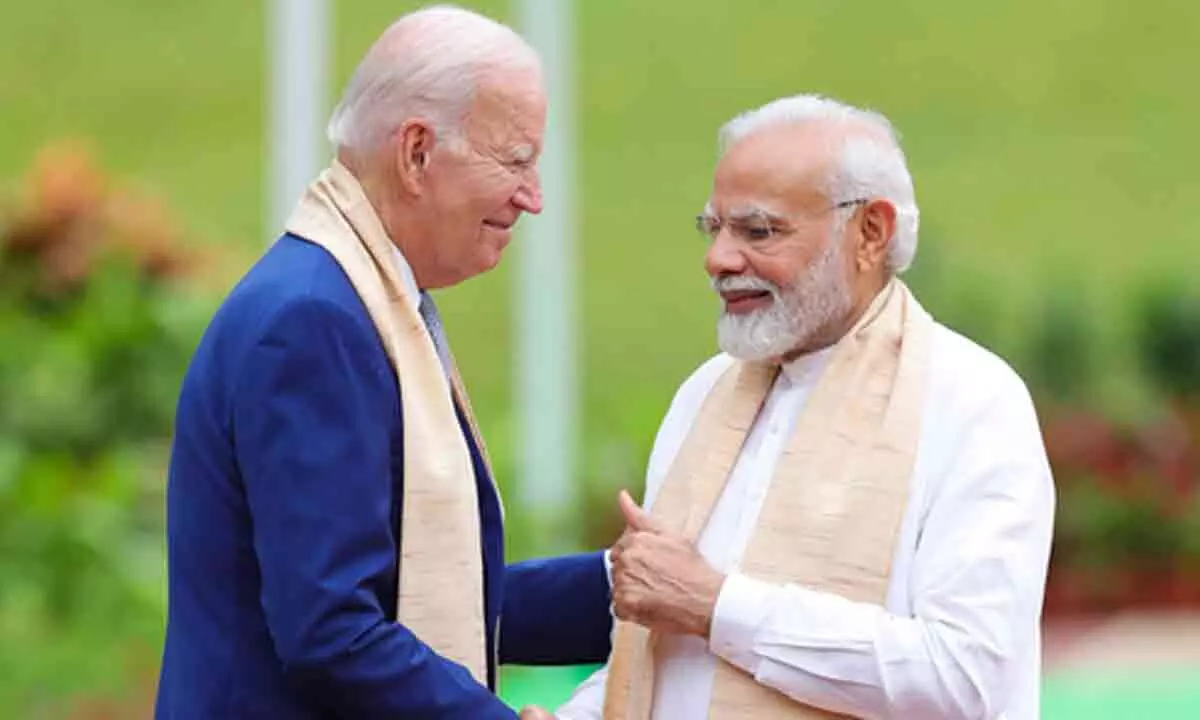Live
- South Korean FM Cho, Blinken hold talks on margins of APEC summit in Peru
- India’s insurance sector growth surpasses China, Thailand: McKinsey
- CLOSE-IN: Indian cricketers from Paupers to Princelings
- Delhi-NCR's air quality remains hazardous for residents
- South Korea, US, Japan to announce establishment of trilateral secretariat this week
- North Korean leader Kim orders mass production of suicide attack drones: KCNA
- Calcutta HC to hear next week plea for CBI probe into death of Jhargram Hospital doc
- Nigeria reports 15,000 AIDS-related deaths annually: Official
- The quicker Mohammed Shami gets fit and is on a flight, it's better for India, says Shastri
- BGT 2024-25: KL Rahul, Sarfaraz Khan suffer elbow in injuries; Virat Kohli taken for scans as India finish first practice session
Just In
Joe Biden says he raised human rights, free press with Narendra Modi

US President Joe Biden said on Sunday that in addition to the "significant business" done at the just-concluded G20 in India such as the rail-ship economic corridor extending from India to Europe, he was able to raise the “importance of respecting human rights … the vital role (of) civil society and a free press” in his bilateral meeting with Prime Minister Narendra Modi.
Washington : US President Joe Biden said on Sunday that in addition to the "significant business" done at the just-concluded G20 in India such as the rail-ship economic corridor extending from India to Europe, he was able to raise the “importance of respecting human rights … the vital role (of) civil society and a free press” in his bilateral meeting with Prime Minister Narendra Modi.
In a customary trip-ender news conference in Hanoi, the second leg of his tour of India and Vietnam. Biden was peppered with questions about China and President Xi Jinping, who had skipped the G20 meeting, and about Ukraine.
In his opening remarks, Biden thanked Modi's "leadership and his hospitality and hosting the G20". He went on to speak about a part of the visit that was overshadowed by the G20 meeting — his bilateral with the Indian leader.
Biden said he and Modi had "substantial discussions about how we're going to continue to strengthen the partnership between India and the United States, building on the Prime Minister's visit to the White House last June".
Biden had hosted Modi in a state visit, with the customary state dinner, which was the first for the Indian Prime Minister. Biden then went on to say: "As I always do, I raised the importance of respecting human rights and the vital role that civil society and a free press have in building a strong and prosperous country with Mr Modi."
The American President may have been trying to pre-empt an issue that has been regularly asked of him and his officials by the American press. In fact, Prime Minister Modi was asked about it himself in the rare news conference he did with President Biden during his June visit.
US officials have said they have not hesitated to raise these issues with their Indian counterparts but not in the manner of one country lecturing the other but as a shared challenge.
The reference is to efforts by former President Donald Trump and his supporters to subvert the 2020 presidential election and the January 6 insurrection, for which he has been indicted in two separate cases.
About the G20 meetings, the American President said: "This was an important moment for the United States to demonstrate our global leadership and our commitment to solving the challenges that matter most to people around the world to invest in inclusive growth and sustainable development, addressing the climate crisis, strengthening food security and education, advancing global health and health security."
"We showed up ready to work and we showed the world the United States is a partner with a positive vision for our shared future," he added.
Left unsaid was that unlike the US, China’s President Xi Jinping and Russia’s President Vladimir Putin did not show up demonstrating their lack of commitment to the G20 platform.
Xi, in fact, had attended the recent meeting of the BRICS in Johannesburg, South Africa, where the group admitted six new members, a move that was supported by China and Russia and not so much by India.
Biden focussed on two of the major achievements of the G20 summit. The first was the launch of the rail-ship economic corridor that starts in India, cutts across West Asia (as the Middle East is called in India) and ends in Europe. It will "open up untold opportunities for transformative economic investment".
"We've also discussed Russia's brutal and illegal war in Ukraine," he said, touching upon the other notable achievement of the summit, a joint declaration. "There was sufficient agreement in the room on the need for justice for just and lasting peace, that upholds the principles of the World Charter, and respect for sovereignty and territorial integrity."

© 2024 Hyderabad Media House Limited/The Hans India. All rights reserved. Powered by hocalwire.com






